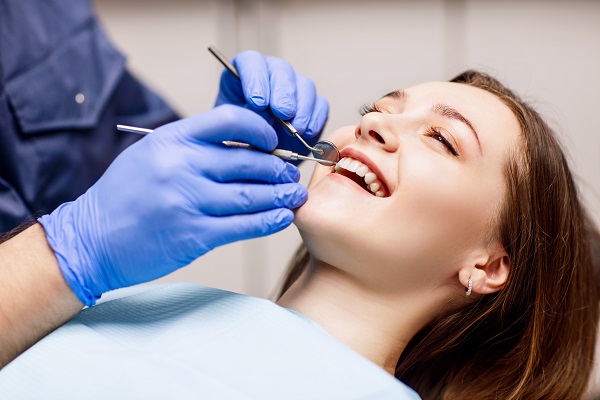How to Prepare for a Professional Dental Cleaning

Done regularly, dental cleanings contributes to a person’s long-term oral health. Professional teeth cleaning removes plaque buildup, targeting hard-to-reach spots that you may miss when you brush and floss.
Usually, professional dental cleaning takes place in two contexts, the first being a routine checkup. General dentists incorporate teeth cleaning into routine dental visits after they examine the teeth and give their patients a clean bill of health. During these routine checks, the dentist will perform standard dental cleaning that targets the structures above the gumline.
The second scenario is when a dentist recommends deep cleaning. A dentist will recommend this option for patients who have gone a while without getting a routine dental cleaning. Such patients may have significant plaque and tartar buildup. Here is the difference between standard and deep dental cleaning.
Standard vs deep dental cleaning: a comparison
Standard or prophylaxis dental cleaning takes less than an hour to complete. Usually, the dentist does the procedure during a routine dental checkup after they confirm that their patient is free of serious dental problems.
Standard cleaning follows an exam of the gum pockets. The dentist starts by using a dental scaler to remove plaque buildup. Next, they use gritty toothpaste to polish the teeth. The dentist concludes the cleaning with a round of flossing and fluoride treatment.
Deep dental cleaning goes further. Also known as scaling and root planing, deep cleaning targets any plaque and tartar buildup that extends below the gumline. It is a procedure geared towards people with gum disease. Scaling and root planing takes place under anesthesia and may take an hour, maybe two. It all depends on the extent of the buildup. The dentist will usually end the procedure by administering antibiotics.
Preparing for a dental cleaning
There are a few things that a patient needs to do before they step inside the dentist’s office. Here are some of the most important ones.
1. Learn about the procedure and what it entails
Find out what to expect from the procedure. This information helps to plan for considerations like after care or a ride home.
The dentist will tell their patients what to expect from dental cleaning depending on the individual’s situation. A patient who needs scaling and root planing may not be in a position to drive home, and that is a useful piece of information to have before the procedure.
2. Take care of the logistics
The patient should confirm their appointment to eliminate any chance of a scheduling conflict. If the patient is visiting a new dentist, they should make sure that their dental records and other pertinent information reach said dentist.
3. Discuss dental anxiety if it is an issue
Many people hate going to the dentist because of the memories, smells and sounds of the dentist’s chair. Talk to the dentist and find out if they can make arrangements to help with anxiety.
4. Consult the doctor and dentist about ongoing medical conditions
Long and short term medical conditions can affect the outcome of a dental procedure. This means that the input of a physician is needed for patients who:
- are on heart medication or blood thinners.
- have weakened or suppressed immune systems.
- have medical implants of any kind.
Informing the dentist of such medical conditions allows them to adjust treatment to meet the needs of their patient. For example, a patient on blood thinners may be a better candidate for laser gum procedures or ultrasonic scaling that cause little to no bleeding.
5. Discuss dental problems
A person who has a cavity or some other dental problem should inform the dentist in advance. This information allows the dentist to craft a course of action that addresses the oral health problem.
6. Brush and floss diligently in the days leading up to the appointment
Brush your teeth before leaving home for the dentist’s office. Not only is this practice good for your oral health, but it also helps out the dentist as they work on the mouth. This tip applies at all times, whether or not a professional dental cleaning is in the books. However, this does not mean that a person should go overboard. They should simply stick to their regular oral hygiene routines.
A healthy set of teeth is easy to maintain
With routine dental cleaning, you can keep your teeth healthy and free of plaque buildup. Teeth cleaning also gives our dentist the chance to check for emergent dental problems. These are just two of many reasons why you should call our office and schedule an appointment today.
Request an appointment here: https://www.bryancousindmd.com or call Cosmetic & Family Dentistry of the North Shore at (781) 443-8268 for an appointment in our Swampscott office.
Check out what others are saying about our dental services on Yelp: Dental Cleaning and Examinations in Swampscott, MA.
Recent Posts
Stay healthy by keeping up regular dental cleanings and examinations at our office.Brushing and flossing your teeth is not the only way to help keep your teeth healthy. No matter how much people brush and floss, there are areas of the mouth that only a professional dentist can reach. This is where we come in.With…
Are you due for a dental check-up? Has it been a while? You may not know what to expect if you have not had a dental check-up in a long time. Read on to discover what happens during a typical dental check-up. Oral health is important, not only for your mouth but for your overall…
Has it been a while since your last dental checkup? Keep your smile healthy by scheduling one today.If it's time for a dental checkup, don't delay. When it comes to maintaining your oral health, it is crucial to seek regular checkups at least twice a year. With professional dental checkups, we can help prevent any…
A preventive dentist is a dental health professional whose services include procedures to protect the teeth and gums from developing problems. This dentist aims to keep your teeth healthy and appealing for the longest possible time.Major dental disorders are avoidable with preventive dental treatment. Preventing future problems and stress from oral health issues early could…


